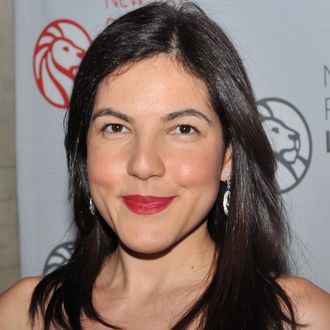
“I speak heavily in analogies,” Sloane Crosley said Saturday at BookCon, where A.M. Homes interviewed her in front of 70 or so fans at the Javits Center. The celebrated essayist (and, full disclosure, a friend) was here to talk up her first novel, The Clasp, a major Farrar, Straus and Giroux title out this coming fall, about three estranged college friends who embark on a French road trip in search of a lost piece of jewelry. It’s an homage to Guy de Maupassant’s “The Necklace,” and the event began with a slightly campy reading of that famous short story by Barbara Rosenblat, introduced as “the Meryl Streep of audio books,” but possibly more familiar as cancer-stricken Rosa from Orange Is the New Black. Following that, the two writers fell into some banter about the writing process, riffing on famous quotes and odd analogies like Abbott and Costello at a Housing Works book launch. Below, a few selected scenes.
Some Rolling Stones wisdom:
Sloane Crosley: It’s the Rolling Stones. You can’t always get what you want. But if you try sometimes—
A.M. Homes: You get what you need.
SC: That was the alternate title of the book.
AH: Was it?
SC: No.
And some of Fran Lebowitz’s.
SC: I wouldn’t necessarily describe the book as sweeping, because I always think of that being many generations of Irish women and dragons. But it covers a slightly wider percentage of the world than kids talking in a bar in Brooklyn. And you know, no matter where you go, there you are. I believe that was Yogi Berra.
AH: Or Fran Lebowitz, I’m not sure.
SC: One or the other. One is better at baseball, and it’s not who you think.
AH: Exactly.
Wait, Fran Lebowitz said this, though, right?
SC: Working on an essay versus a novel is like the difference between seeing to that curtain and seeing to New Jersey. Actually, you can see from here to New Jersey — it’s a terrible example!
AH: No, it’s very true. Novels have a breadth to them, and it’s hard to keep that horizon constantly in sight.
SC: There’s a great Annie Dillard quote, which I’m gonna butcher—
AH: Or Fran Lebowitz.
SC: Or Fran Lebowitz. But it’s about butchering, which makes it funny. But she says to write well — it’s like splitting wood. If you aim for the wood, you’ll miss, but if you aim for the chopping block, you’ll hit it.
Okay, she definitely said this.
SC: Actually, okay, this is Fran Lebowitz. She gave an interview once for the Paris Review about trying to write fiction and saying that fiction writers start talking about how characters are talking to them, and it’s crazy, she’s never had that. And I also thought, I’m never gonna be able to do this, because I didn’t feel that for a really long time. It’s like waiting for drugs to kick in. [Pauses.] Young audience.
AH: Or Tylenol.
SC: Or Tylenol. And you’re just waiting and nothing’s happening, nothing’s happening.
AH: Sloane!
SC: What?! We’re all friends here.
On Grace Paley:
AH: Grace Paley, now that we’re name-dropping —
SC: Yes, yes!
AH: Used to say that as a writer, you never get promoted, you’re never the senior vice-president of writing or the co-director of the academy of vowels, but every time you finish something you go back to the beginning and you think, Oh my God, can I do it again? But I think a lot of it is confidence. If you believe you can, you can. I sound like Thumper now.
On humor:
AH: Do you feel that humor has social uses?
SC: I think humor is the social use. You can put anything in it. I think — yes, I speak heavily in analogies — it is like putting the medicine in apple sauce or a block of cheese for a dog. Not that anyone in this room is a dog in this scenario.
AH: But what is the medicine?
SC: The medicine is how difficult it is to know anyone else.
On logistical difficulties:
AH: Were there things in the writing of it that surprised you?
SC: Well there were logistical things — like, how do I get all three of these people to Paris? — which were difficult.
AH: Usually most planes can accommodate three.
SC: Yes, all in one row, yes. Tell me more about air travel.
On editing:
AH: What was the actual editing process like?
SC: I’ll give you the actual answer but also another analogy, I guess. It starts like major surgery and then it ends up being cosmetic surgery, where it’s like, “Oh, your earlobes are a little” — all the earlobe surgery I’m sure you’re all thinking of having … I actually made sure that at least one of my readers was male because two thirds of the novel is told from a male perspective and — are they thinking about their bodies enough or not? Should I suddenly thinking about sex? I don’t know.
AH: There are some testicles lines in here.
SC: Are there really? I didn’t realize — so that’s upsetting.
AH: There’s something about “You’ve got my balls.”
SC: Did I say that?
AH: Something, but we only have a few minutes, I’m not gonna go there.





